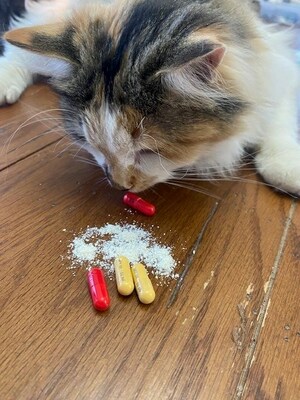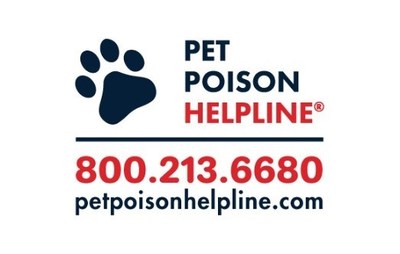Subject: PET
Protecting Your Pet is No March Madness
Elite Eight List of Pet Owner Fouls For Pet Poison Prevention Month
MINNEAPOLIS, March 6, 2024 /PRNewswire/ -- March is not just for madness -- it also happens to be Pet Poison Prevention Month. To help sports enthusiasts remember to protect their pets while cheering on their favorite teams, the toxicology experts at Pet Poison Helpline have analyzed case data and developed a list of the Elite Eight Pet Owner Fouls.
1. Administering Human Pain Medications. Pet owners often give their pet human pain medication when the pet isn't feeling well.
"No one wants to see their beloved pet in pain, so when you see them suffering, it is common to reach for your nearest pain reliever to help them feel better," said Dr. Renee Schmid, a senior veterinary toxicologist at Pet Poison Helpline. "The problem is, animals are very sensitive to human pain medications, particularly NSAIDs like ibuprofen and naproxen, and only a small amount can be potentially deadly. Cats are particularly sensitive to these medications, leaving no room for error if they're given these medications."
2. Human/Pet Medication Mix-ups. Owners may store their medication in the same place as their pet's medication and mistakenly give the pet the owner's medication.
"Do you have a specific place where you store all of the medication in your house?" Dr. Schmid asked. "If so, you are not alone! Many pet parents will keep their pet's medication in the same area as their own medication and have been known to give their pet the human medication by mistake. Depending on the type of medication and amount, potentially fatal consequences can occur. This is especially true for skeletal muscle relaxants such as baclofen and heart/blood pressure medications."
3. Home Treatment for Vomiting. Owners may attempt to induce vomiting in their pet without the guidance of a veterinarian, leading to injury.
"Instructions on how to make your pet vomit are all over the internet," Dr. Schmid warns. "Getting a pet to vomit, however, isn't as carefree as Dr. Google may want you to believe. There is never a safe way to induce vomiting in a cat at home so it should only be done under the supervision of a veterinarian using prescription medication that has been proven safe for cats. Dogs may be able to have vomiting induced at home but only under the guidance of a veterinarian or poison expert, as giving too much hydrogen peroxide can cause severe consequences. Manually trying to gag your pet can result in nerve damage to the protective areas of the airway, salt can cause poisoning to your pet, and the myriad of other options you may read about are often dangerous and ineffective. There are also certain substances that may cause more harm if vomited. Always work with a medical expert when considering if inducing vomiting is necessary for your pet."
4. Inappropriate Storage of Household Cleaners. Cleaning products, such as toilet bowl cleaner, being left out or in the bowl where pets have access to it can have detrimental consequences.
"Having to clean undesirable areas like toilet bowls often leaves us pondering the true meaning of life," Dr. Schmid mused. "Cleaners are often poured into the toilet bowl and left to set for a bit to work their magic. If toilet bowl lids aren't closed, or bathroom doors are left open, our curious furry housemates can find the bottle or water containing toilet bowl cleaner and take a dangerous drink or two."
Toilet bowl cleaners can cause corrosive effects to the mouth, esophagus, and stomach, leading to severe ulceration and pain. Depending on the concentration and amount ingested, these effects can be life-threatening.
5. Garbage Can Temptations. Moldy food left in the garbage can be a tempting treat for pets.
"The great refrigerator clean-out often contains moldy food products that we quickly throw in the trash," Dr. Schmid said. "These moldy foods may contain tremorgenic mycotoxins that result in ataxia, tremors, and seizures. Deaths can occur. If moldy food is placed in the trash, remember to keep the trash can out of reach of your pets, or better yet, immediately take the trash out of the house and place in a larger, more secure trash receptacle."
6. Dangerous Compost Access. Allowing unsupervised pet access to compost piles can become an all-you-can-eat buffet.
"Food and organic material in compost piles may also allow mold with tremorgenic mycotoxins to grow," Dr. Schmid explained. "If using a compost bin, be sure to fence off the area so your furry friend does not have access to any of the great smelling and tasting rotting material!"
7. Rat Poison Placement. Placing rodenticides in an area accessible to pets can kill more than just rodents.
Sometimes, no matter how hard we try, rodents such as mice and rats get into our homes, our garages, and our sheds," Dr. Schmid said. "In an effort to rid these areas of the pesky rodents, mouse and rat baits are often set out. These baits have varying active ingredients that can be fatal depending on the amount ingested. If using mouse and rat bait in the same area that a pet is around, be sure to keep the bait far out of the pet's reach and only use in the bait station supplied by the bait manufacturer. While these don't completely eliminate the risk that your curious pet may get into the bait, it can help make access a bit trickier. Also, if bait is not kept in the recommended bait station and left out loosely, it is possible that a rodent can carry the bait to another area that is more easily accessible to your pet."
8. Convenient Cocktail Access. Alcoholic and caffeine containing beverages left sitting out on a low table (coffee table, end table) are no reason to party for our 4-legged companions.
"It's easy to get distracted while leaving your alcoholic or caffeine-containing beverage on a low table, giving your pet sufficient time to ingest just enough to cause poisoning," Dr. Schmid warns. "Animals do not tolerate alcohol or caffeine in the same manner that people do, and small amounts can be enough to require a trip to the veterinarian, while larger amounts can result in death."
"As humans, life gets in the way, and we make mistakes now and again. If you make any of these fouls, or your pets get into other things that may be toxic, contact your veterinarian or Pet Poison Helpline immediately," urged Dr. Schmid. "We're here to help save your pet's life when potential trouble arises."
About Pet Poison Helpline
Pet Poison Helpline®, your trusted source for toxicology and pet health advice in times of potential emergency, is available 24 hours, seven days a week for pet owners and veterinary professionals who require assistance treating a potentially poisoned pet. We are an independent, nationally recognized animal poison control center triple licensed by the Boards of Veterinary Medicine, Medicine and Pharmacy providing unmatched professional leadership and expertise. Our veterinarians and board-certified toxicologists provide treatment advice for poisoning cases of all species, including dogs, cats, birds, small mammals, large animals and exotic species. As the most cost-effective option for animal poison control care, Pet Poison Helpline's fee of $85 per incident includes follow-up consultations for the duration of the case. Based in Minneapolis, Pet Poison Helpline is available in North America by calling 800-213-6680. Additional information can be found online at www.petpoisonhelpline.com.
Contact:
Dr. Renee Schmid,
Pet Poison Helpline®
(952) 806-3803
[email protected]
SOURCE Pet Poison Helpline
These press releases may also interest you
|
News published on and distributed by:





